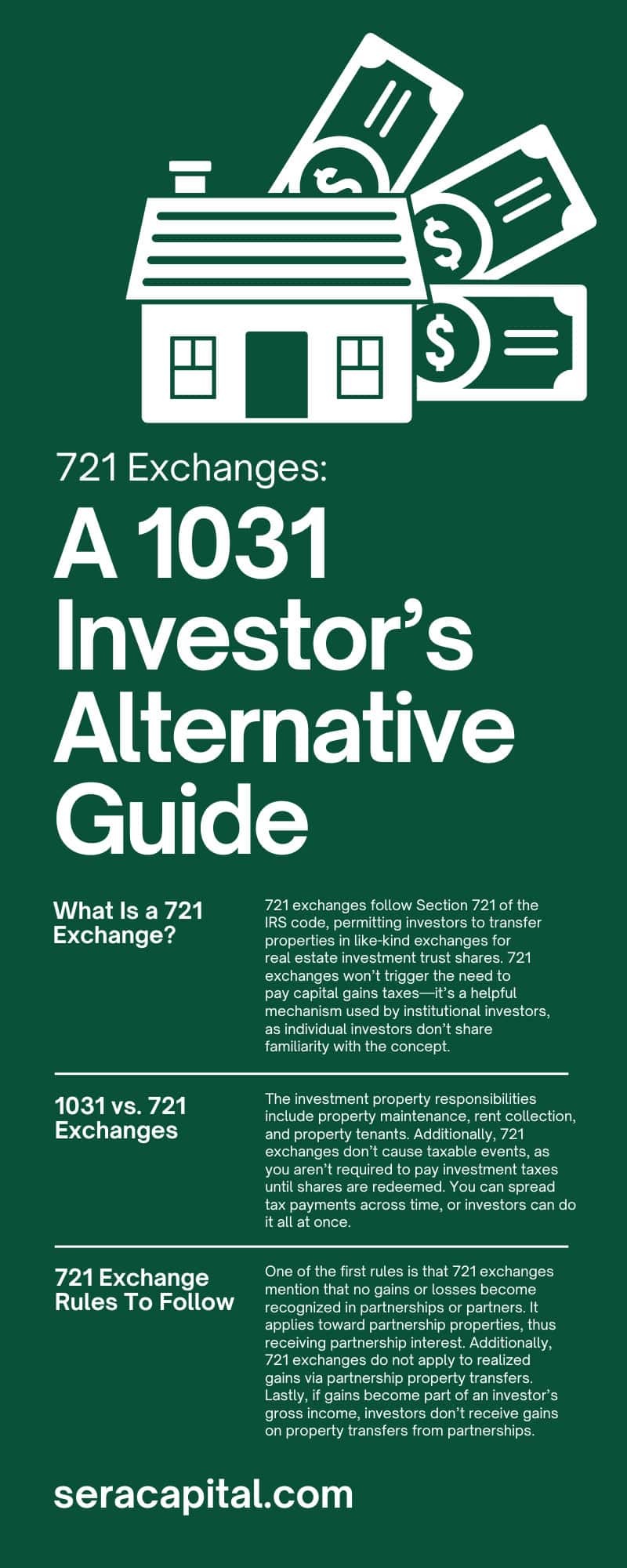721 Exchanges: A 1031 Investor’s Alternative Guide

Carl E. Sera, CMT
September 13, 2023
Many investors with multiple real estate properties desire to defer capital gains tax for years while increasing cash flow. Read on to explore a brief guide to 721 exchanges and learn how they can help investors.
What Is a 721 Exchange?
721 exchanges follow Section 721 of the IRS code, permitting investors to transfer properties in like-kind exchanges for real estate investment trust shares. 721 exchanges won’t trigger the need to pay capital gains taxes—it’s a helpful mechanism used by institutional investors, as individual investors don’t share familiarity with the concept.
Investors utilize 721 exchanges to manage cash flow, then reinvest other properties without requiring direct sales taxes due to it being an IRS-sanctioned process. Additionally, 721 exchanges work for consolidating multiple properties by transforming them into a single property. This method assists investors by reducing overall investment portfolios.
1031 vs. 721 Exchanges
Investors often use 721 exchanges as an alternative to 1031 exchanges for their managerial responsibilities and tax capabilities. While both offer unique benefits to investors, their differences determine whether they fit specific investment plans. One considerable difference is the daily management and property ownership responsibilities.
The investment property responsibilities include property maintenance, rent collection, and property tenants. Additionally, 721 exchanges don’t cause taxable events, as you aren’t required to pay investment taxes until shares are redeemed. You can spread tax payments across time, or investors can do it all at once.
1031 Exchanges Pros and Cons
After briefly going over 721 exchanges, it’s essential to learn about the pros and cons of 1031 exchanges. Firstly, 1031 exchanges allow for capital gains tax deferment, which allows wealth to accumulate faster, increasing before your first investment. Furthermore, 1031 exchanges expose investors to new markets, allowing them the power to quickly unload existing real estate investments and get exposure to new markets. Lastly, 1031 exchanges allow for capital gains deferment until the passing of the investor.
However, 1031 exchanges also have their downsides. To start, 1031 exchanges have a specific timeline investors must follow. Investors have 45 days from the starting sale date to relinquish their property for a like-kind one, then 180 days to close the sale of the replacement property. Moreover, finding like-kind replacement properties can become a struggle, so investors must plan before starting a 1031 exchange.
Can 1031 Exchanges Become REITs?
Investing in real estate is an exceptional strategy to diversify investment portfolios and increase passive income. A REIT, or real estate investment trust, can operate as a helpful investment tool for increasing cash flow, especially for investing in real estate with managerial responsibilities.
Can you turn your 1031 exchange into a REIT? While investors can’t turn 1031 exchanges into REITs, there are alternatives to consider for capital gains deferment. These alternatives include Delaware Statutory Trusts (DSTs) and umbrella partnership real estate investment trusts (UPREITs). These are optimal investment tools that can help increase cash flow, defer capital gains, and establish estate planning.
Benefits of 721 Exchanges
Investors who want to pursue 721 exchanges receive many benefits. It can range from obtaining passive income opportunities to various tax advantages. Discover some benefits that can entice investors into performing a 721 exchange.
Estate Planning
One of the first benefits of 721 exchanges is for investors to pass their assets onto their chosen heirs. When the time of an investor’s passing comes, shares split equally, either passing through trusts or remaining held.
Because physical real estate can become difficult to sell, 721 exchanges can pass down to chosen heirs, receiving a step-up basis by deferring capital gains taxes. Furthermore, the state also defers depreciation recapture taxes.
Portfolio Diversification
Another reason investors choose the 721 exchange is the ability to diversify their assets. More specifically, 721 exchanges allow investors to obtain diversification capabilities across industries, tenants, asset classes, and geographies in REIT structures. Individual investors participate in real estate portfolio diversification, no longer dependent or concentrated on a single asset, obtaining appreciation and cash flow.
REITs also provide similar real estate ownership benefits, such as depreciation tax shelters, income, appreciation, principal pay downs, and more. Numerous REITs continuously make ongoing acquisitions. Moreover, it allows investors to benefit from future buying opportunities without triggering depreciation recapture tax events or capital gains tax.
Tax Advantages
Many investors choose 721 exchanges due to their tax advantages. 721 exchanges permit investors to defer capital gains tax through tax-deferred exchanges of appreciated real estate assets. This impacts operating partnership shares, also known as OP Units. OP Units can convert into REIT shares, which can be sold for operating partnerships.
Furthermore, REITs require distributing 90 percent of an investor’s taxable income via dividends paid to shareholders. These dividends become declared annually by REITs, typically distributed monthly or quarterly. It’s a helpful tool for continuously deferring capital gains and increasing passive income.
Passive Income
Another perk of 721 exchanges is the passive income opportunities. The economy can drastically impact property investments, including market fluctuations. These fluctuations can result in cash flow changes in rental properties, thus creating less rental income than previously established. 721 exchanges pay shareholders with dividends and create passive income.
Managers take charge of REIT operations and asset management, while investors have a considerably smaller role. Managers take on the daily decision-making for portfolio assets. Adversely, 721 exchange investors receive updates and information regarding acquisitions, dispositions, and distribution from the managers. Moreover, investors can use their time to focus on their other real estate investments while managers handle the everyday work.
721 Exchange Rules To Follow
Pursuing a 721 exchange involves meeting specific rules and qualifications. Initially, 721 exchanges required institutional-grade real estate investments due to investors owning particular properties. 721 exchanges also don’t allow direct property contributions for REITs. There are several rules to follow for pursuing 721 exchanges.
One of the first rules is that 721 exchanges mention that no gains or losses become recognized in partnerships or partners. It applies toward partnership properties, thus receiving partnership interest. Additionally, 721 exchanges do not apply to realized gains via partnership property transfers. Lastly, if gains become part of an investor’s gross income, investors don’t receive gains on property transfers from partnerships.
Sera Capital offers its services and expertise to individuals with highly appreciated assets. We are a fee-only fiduciary that offers knowledge of 721 and 1031 exchanges, along with information for Delaware Statutory Trusts, Opportunity Zones and Funds, and more. Our 721 UPREIT exchange services allow investors to increase portfolio diversification and investment liquidity while deferring capital gains. If you have questions about our 721 exchange services, schedule a free phone call today.

Categories
Strategize Your Success
